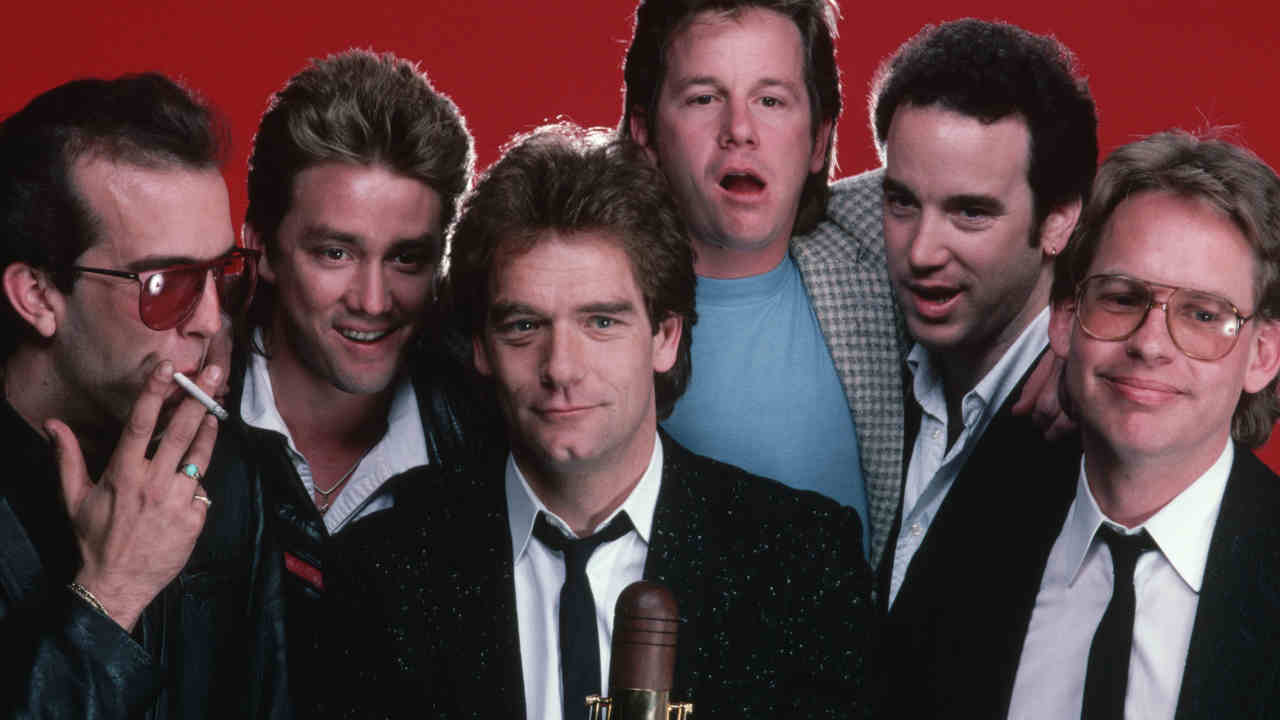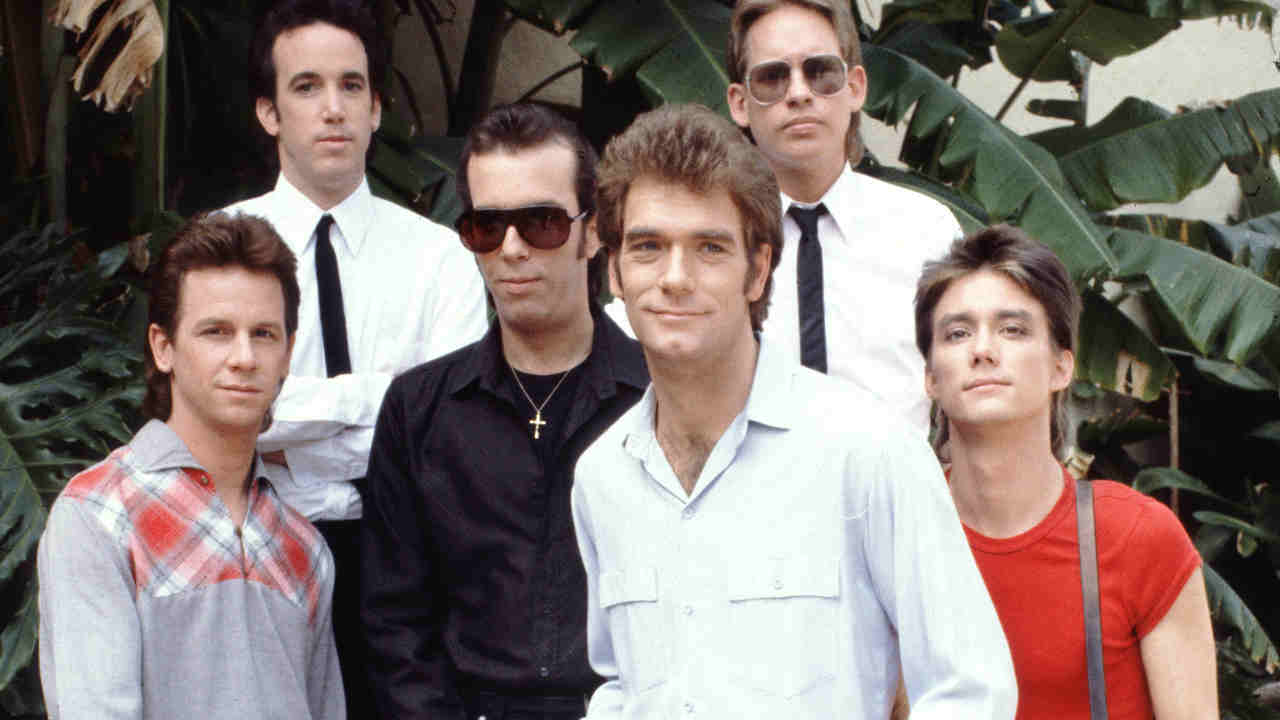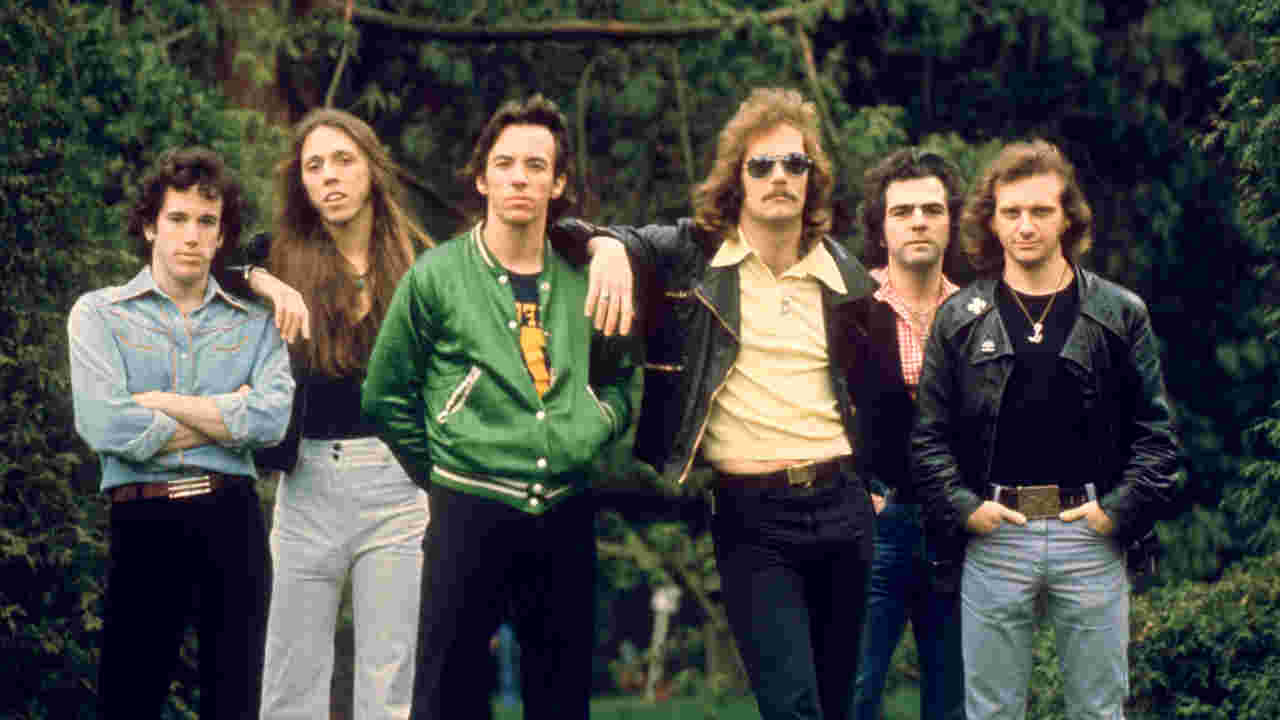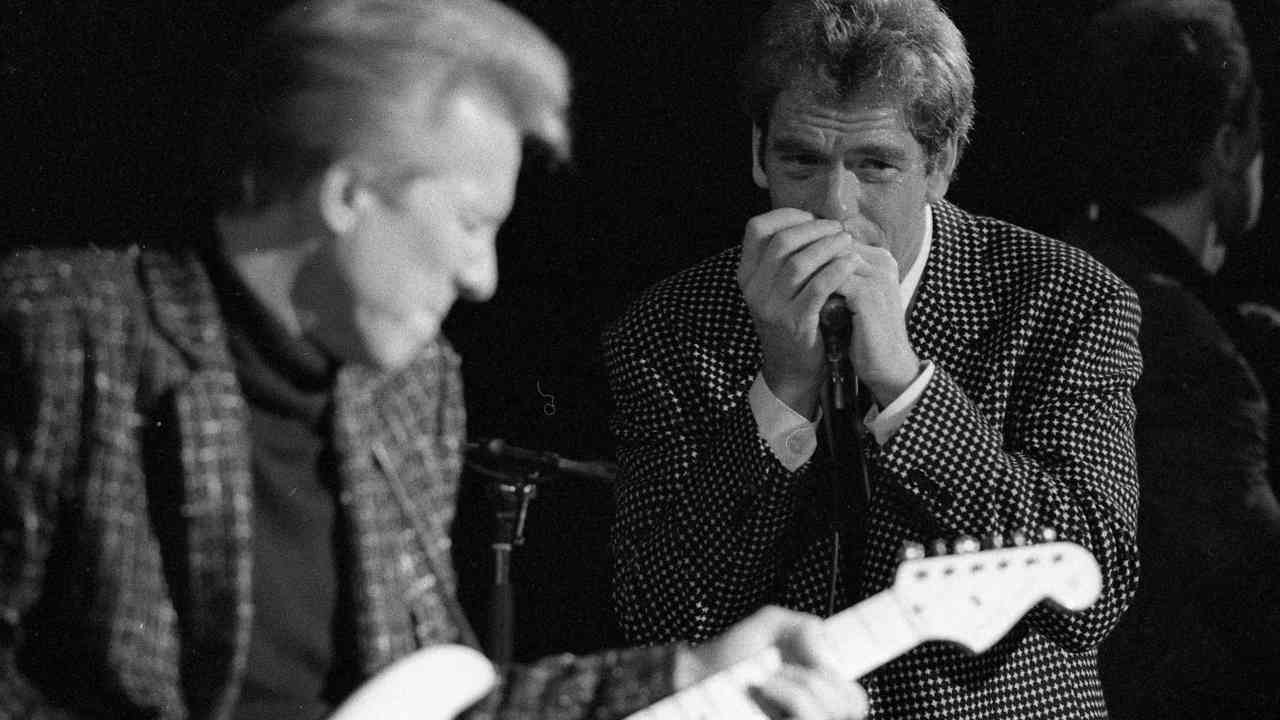
There’s a twinkle in Huey Lewis’s eye as he contemplates the damage that 20 million album sales have done to his career. “People think we’re a pop band,” he says, “but we’re not a pop band. Never have been. We just had some huge successes that hurt us a little.”
Well, it’s not so much the multi-million album sales as the dozen consecutive American Top 20 hits that have irrevocably branded Huey Lewis & The News as a pop band. What’s more, they shamelessly contrived to get hits.
“True,” Huey replies, without a trace of apology, as he tucks into his tuna salad in the atrium restaurant at London’s elegant Landmark Hotel. “Hits are a way to make you hot. When you’re hot you learn how to play live to become big. So that when you’re not hot any more you’re still big. And that’s the way it’s worked for us.”
The strategy paid off for them. In the mid-80s, Huey Lewis & The News were one of America’s biggest bands – a good time group hated by hipsters but beloved by the people who actually counted: the ones who bought records. And buy records they did – 1983‘s Sports sold seven million copies, 1985’s Fore! shifted another three. Like ZZ Top before them, the News were a bar band who harnessed new technology to a classic sound, in their case bluesy R&B. “It was the old and the new all at once,” says Lewis.
It may have looked like an overnight success story, but Huey had been waiting for success to arrive for the previous 10 years. And when it came he was ready for it.

Brought up in the 50s in the Bay Area of San Francisco by liberal parents whose house was a regular hang-out for the beat generation (“I’d wake up in the middle of the night and there’d be this raging party going on. I’d wander out into the hallway and Allen Ginsberg would be there, waving his finger cymbals”), Hugh Anthony Cregg III was academically bright. He was set to study electrical engineering at college, before his father sent him bumming around Europe for six months – they didn’t have gap years back then.
Somewhere in Europe he took up the harmonica, and by the time he’d reached London’s Marble Arch underpass he could earn a crust from busking. By the time he got back to America his outlook had changed. By the beginning of the 70s he’d quit college and was back in the Bay Area, playing with various bluegrass bands before joining a country rock band called Clover – who would later comprise the nucleus of Huey’s band The News.
While Clover scraped a living up and down the US West Coast, the two albums they’d recorded for Fantasy (which were ignored in America) became popular among London’s burgeoning pub-rock scene and particularly by bands like Brinsley Schwarz, Ducks Deluxe and Bees Make Honey.
“One night in ’76 we’re playing the Palamino Club in LA,” Huey recounts, “when in walks [Brinsley Schwarz’s] Nick Lowe, [Stiff Records co-founder] Jake Riviera and four guys in suits – Dr Feelgood. They’ve been playing a CBS convention, and Nick has come over as Wilko Johnson’s guitar roadie. He lands up sitting in with us, and when we ask what song he wants to play he picks an old one we can barely remember and plays it perfectly. Even sings it. It blew my mind.”
Lowe and Riviera convinced Clover that the future was bright in Blighty, and a plan was hatched. But even as the group touched down at Heathrow, the first tremors of punk were being felt in the UK. “The week we arrived I went to see the Clash at the Roundhouse, and the audience are gobbing on them and Joe Strummer is covered in spit, and I’m like, ‘What is going on here?!’.” Huey recalls.
The tremors weren’t yet strong enough to prevent Clover from getting a record deal with Phonogram, but while they were making their album their hosts were busy setting up Stiff Records, and the pub rock scene was changing beyond recognition. Still, at least they had a grandstand view of it all. And they also got their album produced by some obscure Phonogram house producer called Robert ‘Mutt’ Lange.
“He’s an incredible producer. But it’s his vision,” Huey says. “We just weren’t mouldable enough. He literally came in and arranged everything. It just didn’t work. And those records don’t hold up.”

Clover eventually retreated back to the States. But the memory of watching Dave Edmunds and his band Rockpile playing raunchy rock’n’roll with unabashed gusto lingered with Huey. “I saw them playing just what they wanted and trying to make it as good as possible, and I figured, ‘If they can do that, I can do that’.”
He formed a band called American Express, and once again built up a reputation on the West Coast before the Brits intervened again, this time in the form of Chrysalis who were happy to take a punt on the group, provided they changed their name. Their first album, Huey Lewis And The News, in 1980, was smart power pop with a cool soulful swing and neat songs like Trouble In Paradise and Some Of My Lies Are True.
“Yeah, they’re cute but they’re not dumb,” Huey reflects. “The album got some good reviews which basically said, ‘These guys are serious’, and we went out and toured. But it sold not at all.”
Huey realised they’d need a hit off their second album, “or Chrysalis would let us go and it would all be over. So we were going to have to make some hard commercial choices. And I wanted to make those choices myself. What I saw then was maybe having to compromise ourselves or find a radio-friendly hit. And I wanted to be the one to make those choices, because I knew I was going to have to live with it.”
That meant they were going to have to produce it themselves. Eventually Chrysalis relented. “No big American label would have let us do that,” Huey says. “And that was when we learnt how to make our own records; in fact records in general. My original theory was that if we did a maximum of three takes – just go in and play it as fast as we could – then we’d sound live. What I failed to realise is that it’s not live, it’s tape. If you want tape to sound live you have to spend time making it live.”
The key turned out to be a song by their old mate ‘Mutt’ Lange called Do You Believe In Love, which was Huey Lewis And The News’s Top 10 breakthrough in the States in 1982. “We all knew it was a radio-type tune,” Huey says. “The only question was, could we make it live for us? Because it was very pop – poppier than we’d ever been. But we changed it around and it worked out.”
The stakes were higher for the Sports album, but the band were primed and, once they’d learned to love the drum machine, the hits rolled in – five of them off a nine-track album. “I knew we had four or five really good songs,” Huey says. “In fact, Sports is only about half a dozen songs deep. And then it just falls apart.”
“But once the second one hit I knew the rest would go as well. It was a momentum thing. But the other thing was that there was nothing thematic about the album. I mean, Bad Is Bad and Walking On A Thin Line – what do they have in common? And If This Is It and I Want A New Drug? Same thing. Back in the 60s people bought records and they wanted to have different tunes on them. Like the early Beatles albums. It was part of the charm of it.”
Along with the charm came the zeitgeist. Huey found himself in a room with Steven Spielberg and associates talking about their movie Back To The Future.
“They’re telling me about this Marty McFly character [played by Michael J Fox], whose favourite band would be Huey Lewis & The News. So would we write some songs for the movie? I said, ‘We don’t know how to write songs for movies but we’ll send you the next thing we write’. Which was The Power Of Love.”
The song was an international hit and their first US No.1. Which just intensified the pressure on the next album, Fore. “Yeah, we felt it,” Huey admits. “It got the point where we’d worry about every note; I didn’t want to leave one bad moment on the tape. We produced that one tits-out.”
Pressure turned to panic when Bob Clearmountain was kidnapped by Bruce Springsteen to help build his Tunnel Of Love. Huey and his News ended up mixing Fore by themselves. In doing so they may well have “made a lot of mistakes; some of the drum echoes were so big”. Nevertheless, Fore yielded another couple of No.1s and three more Top 10 singles.

It seemed they just couldn’t stop writing hits. “It was one of those things where you open the door a little bit and, whammo! After years of A&R guys going, ‘I dunno, I’m not sure that’s a hit’, eventually we start getting hits, and all of a sudden every little ditty we come up with the A&R guy’s going, ‘That’s a smash!’. And I’m thinking, ‘This can’t be right’.”
And while Huey and The News were perfectly capable of writing Hip To Be Square (too hip for many Americans who didn’t get the irony) and Stuck With You themselves, they had no hesitation in using outside songwriters, such as Bruce Hornsby who wrote Jacob’s Ladder.
Small World, in 1988, was a deliberate shift in direction. But it got slammed by the critics for the band having moved away from their roots.
“That hurt,” Huey admits. “But it wised me up to a lot of stuff. It was probably good that it happened. What annoyed me was that it was absolutely our best work to date. We were getting better musically all the time; we got the mixes right – the way they should have been done on ‘Fore’ – and it sounds great. A lot of people reckon ‘Small World’ is their favourite album.”
Small World remains arguably Huey Lewis And The News’s best album, even if it doesn’t contain their best songs. Mind you, ‘Perfect World’ notched up another top-three hit before the title track broke the sequence, failing to make the Top 20 and trailing the news that the band was no longer hot, just big. But they were kind of prepared for that too. It was part of the momentum thing.
“In fact that was more evident on our next album, [1991’s] Hard At Play, which was on its way to becoming a great record. The idea was to go back to basics. And I’d written four really good rock’n’roll songs. We did rough mixes, and the record company heard them and said, ‘We’re not sure’. And by now it’s the nineties and I’ve got my family and I’m not as invested. I’m more indecisive. I let them talk me into a producer. And the album is a hotchpotch.”
But it wasn’t just Huey who was being indecisive. “The record company kept saying, ‘You gotta rock’. So I said, ‘How about Couple Days Off? Does that rock hard enough for you?’ And they went, ‘Oh, yeah’. So what happened? Real rock stations wouldn’t play it because we were Huey Lewis And The News. So now we had image problems at the radio stations.”
Even so, Couple Days Off only just missed the Top 10 in 1991. But by now Huey Lewis was concentrating on making good albums rather than hit singles. Dealing with A&R guys was bad enough, but phone research was another matter.
“They phone you up and play 30 seconds of a song down the line and then get your reactions. And then they tell you it’s testing positive with this or that demographic. That’s why the whole thing is such bad shape. Because we all know that the best stuff you don’t get first or even second time around. These days the only stuff that gets played sounds like something you already know.”
Huey Lewis And The News’ post-millennial career may not have scaled the heights as they did in their 80s pomp – 2001’s Plan B limped to No.185 in the US charts. But they forever hold a place as the band that helped soundtrack the 80s. Just don’t call them a pop band.
Originally published in Classic Rock issue 59







